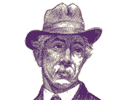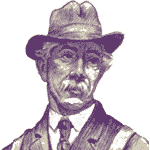|
|
|

U
What would FAILURE be without U? Please write in to sandage@born-losers.com with your questions, comments or failure stories. With your permission, we'll anonymously post emails and answers here.

Dr. Sandage,
I read about your latest work in the Washington Post this morning. You clearly posed a fascinating question. What an awesome exploration; I can't wait to read your book.
The topic of success comes up quite often among homeschooling parents, of which I am one. We often discuss the question: What is the definition of success? By taking our children out of the programmed messages of public school-- success is the right clothes, the right amount of money, the right degrees, the right color hair and skin, the right size house-- and allow our children to explore their gifts and strengths, success becomes more about being a whole human being with a desire to learn and grow. Success and happiness also seemed forever linked and many homeschooled children get to redefine success to mean, for example: I like to work on cars, I am good with my hands, I can make a living doing something I love, therefore I am successful.
If one starts looking at success stories, one often sees that people who were successful in life were miserable students in public school. Einstein's story is well know, but then there is William Wrigley who dropped out of school, worked as a salesman and went on the make a million in gum. Thomas Edison was schooled at home because the strictures of public school prevented him from dabbling. These guys were school failures, but found success on a different path, a corollary to your work, I'm sure.
I was also struck by the story of William Henry Brisbane and how it was perceived by the officer for the Mercantile Agency. I got to thinking about L. Frank Baum's father, Benjamin Ward Baum. He started a barrel factory with his brothers in the 1850s. The factory never thrived partly because of bad business decisions, partly because of economic situations in the world. The elder Baum left central NY to head for the Pennsylvania after Drake discovered oil. Baum went on to become a rich man, but not before saddling a brother-in-law and a business partner with a failing barrel factory. So I guess another corollary to failure is being used by someone who is on their way up the ladder.
In any event, as I homeschool my children, we often talk about the nature of failure. My favorite line is: we don't learn from success; we learn from failure. Of course, as you point out, society does not buy that mantra, hence one of the many reasons I have pulled my children from the shallow messages of the mainstream. The No Child Left Behind legislation now defines success in very specific terms, so kids in school will now feel more like failures than succeeders.
In the end, maybe there is something very innate about the need for humans to succeed? On some Darwinian level those cavement who succeeded in finding food insured that their families would survive?
Your work will prove to be seminal. Looking at your next project I can see that as an academic you think out-of-the-box and ask great questions!
Best wishes,
Sue *******, PhD Trenton, NJ

Dear Dr. *******:
Thanks for reading about my book and for taking the time to write. I did not know that these issues were so important to homeschooling parents, but I am glad to hear it.
One of my bugbears is the way schools, and many parents, measure "excellence" by how far "ahead" a student is working, beyond the appropriate grade level. In my opinion, there is never a good reason for a 15-year-old to be in college, and I think many would be happier and better adjusted if we challenged "gifted" kids in ways other than intellectual. You used the word "dabbling," and that's a great word. I wish we would motivate kids by letting them "dabble" when their algebra is done, rather than telling them, "OK, now you are ready for trigonometry."
I always wonder why, when a gifted student is "bored," the answer seems to be to push her or him along to the next academic level, rather than to say, "Fine, let's have you learn to juggle or milk a cow or transplant lilac bushes or bake bread, until the other students catch up to you in algebra." I teach far too many students at CMU who are brilliant but don't know how to have fun and don't know how to experience the world through any mode other than words or numbers.
I myself didn't learn how important it is to get AWAY from words and numbers, until I was struggling to finish "Born Losers." Having always been a "high achiever" myself, it was harder to write about failure than I expected. And when it took longer and longer to finish the book, I felt like I was BECOMING my topic: a loser. One thing that helped a lot was learning to play the banjo! I took 8 classes, learned 3 chords and a basic strum, and thereafter, if I got stuck writing I plinked a little until my ideas flowed again, rather than staring at the computer and getting frustrated.
Once a semester or so, I bring my banjo into class and play in front of my students. I am barely a rudimentary player, I have to stop in the middle of songs and try again, but I play by ear whatever song comes into my head and I love it. I embarrass myself in front of my classes to make the point that it's OK to do something because you love it, not because you are the best at it, or even good at it. Many students seem to have grown up with the assumption that you must find what you are best at and do that, even if you hate it, because that's your best chance to "succeed."
You mentioned William Henry Brisbane. He was an amazing person, a true hero, and I'm glad to be able to tell his story. I had notes on L. Frank Baum and his father, whom you mentioned, but in the end I just could not squeeze them in.
I couldn't agree with you more about "No Child Left Behind," which takes the most cynical and soul-less attitude to defining and measuring success. Hardly a day passes when I am not thankful to have been educated in public schools in a small city in Iowa during the 1970s, when the last generation of gray-haired old ladies were still teaching and we had recess three times a day.
Thanks again for writing, and for giving me a further chance to think about these things. Good luck to you and your lucky children.
Regards, Scott

Hi Scott, I read the article in the WP today about your book. I've never heard of the Mercantile Agency and would like to know where the records are. Are they at the National Archives in DC? I have an ancestor who was a loser and it would be very interesting to see if he's in the Mercantile Agency records. He was born to a prominent, wealthy family but both of his parents died by the time he was ten years old and that pretty much put him on the road to Loserville. Are the records accessible to a non-researcher person such as myself or do I need credentials? I can't wait to read your book. Thanks much. -
Sarah *******

Dear Sarah:
Thanks for reading about my book and for your message. The records of the Mercantile Agency (which turned into Dun & Bradstreet) are at Baker Library, Harvard Business School. I'm sorry to say that Harvard is a pretty tough gate to crash, even when you have scholarly credentials.
Several factors would influence whether any record was even created about your ancestor.
First, did his career fall between 1840 and 1880? The extant files (2680 enormous bound ledgers with handwritten entries) span approximately those years. In the 1870s, the agency switched from handwritten to typewritten records. Unfortunately, the later, typed files did not survive, because cheap typing paper is not as durable as bound volumes of fine ragstock pages.
Second, your ancestor's occupation(s) would affect whether any file was ever created. The firm usually tracked only those who were likely to ask for business credit (not consumer credit) in New York City. For example, a storekeeper in Ohio ordering dry goods from a Manhattan wholesaler.
Third, depending on where your ancestor lived, the agency did not expand its operations everywhere right away. For example, there are files from Boston in the early 1840s, but nothing from Wisconsin that far back.
Finally, gaining access at Harvard Business School may be easier if your ancestor lived in/near New York City. The index of names for that area is available online, so you could check the HBS website to see whether they have a file on your ancestor, and if they do, you may be able to order a photocopy by mail.
I hope these explanations are helpful, and of course, I also hope that you'll read and enjoy my book. Regards, Scott
Scott A. Sandage
|



